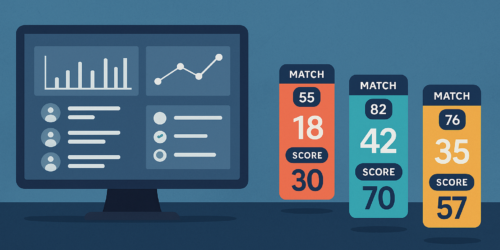What's in this article?
Predictive analytics has emerged as an indispensable tool for enhancing lead quality in the competitive landscape of sales and marketing. By leveraging data-driven insights, predictive analytics transforms the lead scoring process, enabling businesses to prioritize high-potential leads effectively. This article delves into the pivotal role of predictive analytics, particularly predictive lead scoring, in optimizing the sales pipeline and ensuring that sales efforts are focused on the most promising opportunities.
Understanding Predictive Lead Scoring
Predictive lead scoring is a sophisticated approach that employs algorithms and data analysis to assess the potential of leads converting into customers. Unlike traditional lead scoring methods, which often rely on static criteria and manual inputs, predictive lead scoring utilizes machine learning models to analyze historical data and identify patterns and correlations. This dynamic process results in more accurate and nuanced scoring that can adapt over time as new data becomes available.
In practice, predictive lead scoring aggregates various data points, including engagement metrics, demographic information, and transactional history, to generate scores that reflect a lead’s likelihood to convert. These scores allow sales teams to prioritize efforts on leads most likely to result in sales, thereby increasing conversion rates and optimizing resource allocation.
Benefits of Using Predictive Analytics for Lead Quality
The integration of predictive analytics in lead management offers several key benefits:
- Enhanced Accuracy
By processing large volumes of data, predictive analytics refines lead scores with greater precision than manual methods, reducing errors and inconsistencies. - Efficiency in Resource Allocation
Sales teams can focus their efforts on high-scoring leads, ensuring their time and resources are directed toward prospects with the highest potential, which reduces the sales cycle. - Improved Conversion Rates
By targeting leads more likely to convert, predictive analytics directly contributes to higher conversion rates, translating to increased revenue and growth. - Continuous Improvement
As predictive models learn from new data, they continuously improve, providing sales teams with increasingly refined insights into lead behavior and preferences.
Implementing Predictive Scoring in Your CRM
Integrating predictive analytics into your existing Customer Relationship Management (CRM) system is crucial for enhancing lead management strategies. To implement predictive scoring effectively, organizations should:
- Assess Compatibility
Ensure that your CRM system supports integrations with predictive analytics tools. Most modern CRMs offer APIs that facilitate this process. - Data Quality
Maintain high-quality data as poor data can skew predictive models and reduce the effectiveness of scoring. Regular audits and data cleansing are essential. - Collaboration with Sales and IT Teams
Ensure that sales and IT teams collaborate closely to tailor the predictive models to suit specific business needs and goals. - Pilot and Iterate
Start with a pilot program to refine processes and models before full-scale implementation. Use feedback and results to make necessary adjustments.
Case Studies: Success Stories in Lead Quality Improvement
Several companies have successfully leveraged predictive analytics to transform their lead quality. For instance, a leading mortgage provider used predictive lead scoring to streamline their sales funnel, reducing the lead conversion time by 20%. By focusing on high-scoring leads, they increased their conversion rates by 30% within the first year of implementation.
Meanwhile, an insurance company integrated predictive models to reshape their lead management process, achieving a 25% increase in sales efficiency by redistributing focus to segments with historically higher conversion rates.
FAQ
What is predictive lead scoring?
Predictive lead scoring is a method that uses machine learning algorithms to analyze data and predict the likelihood of leads converting into customers.
How does predictive scoring improve lead quality?
It enhances lead quality by providing more accurate scoring that allows businesses to prioritize high-potential leads, improving resource allocation and conversion rates.
Can predictive scoring be integrated with existing CRM systems?
Yes, most modern CRM systems support integration with predictive analytics tools, allowing organizations to enhance their lead management capabilities.
What kind of data is used in predictive scoring?
Predictive scoring utilizes a variety of data, including past interactions, demographic details, and behavioral data, to generate accurate and dynamic lead scores.
What are the potential challenges in implementing predictive analytics?
Challenges may include ensuring data quality, aligning models with specific business processes, and maintaining collaboration between sales and IT teams.
What’s Next?
Elevate your lead scoring process and boost your sales outcomes with predictive analytics. Discover how ProPair’s AI solutions can transform your lead handling—book a demo today. Experience firsthand how data-driven decisions can enhance your sales strategy, optimize resource allocation, and drive revenue growth.



